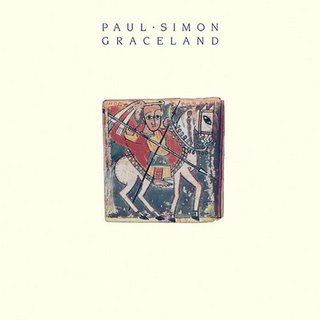And Call Ourselves An Institute
 On our last trip to Virginia, we divided up Dad's tapes and CDs. I took some Leonard Cohen, a few Rickie Lee Jones tapes I'd made for him, a CD copy of Graceland, and a tape of a Greek singer whose name I can't spell offhand. It'd been a long time since I listened to Graceland, and I'd forgotten I'd always had questions about that album. If I could, I'd call up Paul Simon for each and every low-down.
On our last trip to Virginia, we divided up Dad's tapes and CDs. I took some Leonard Cohen, a few Rickie Lee Jones tapes I'd made for him, a CD copy of Graceland, and a tape of a Greek singer whose name I can't spell offhand. It'd been a long time since I listened to Graceland, and I'd forgotten I'd always had questions about that album. If I could, I'd call up Paul Simon for each and every low-down.As a developing writer, you acquire an ear for words that feel out of place or put there as a signal. They feel like a bump in a smooth stretch of road. Let's try out these words from That Was Your Mother:
Along come a young girl
She's pretty as a prayerbook,
Sweet as an apple on Christmas Day.
I said, "Good gracious, can this be my luck?
If that's my prayerbook,
Lord let us pray."
If you're half-listening, nothing happens here but accordians and a story of a young man meeting a young woman. Simon is a really sophisticated lyricist, and a closer listen teaches you a few things. He's a New Yorker, for one thing. New Yorkers did not say "pretty as a prayerbook" at the end of the twentieth century, when this song was written. That's an old-fashioned southernism, which he follows with the humble "sweet as an apple on Christmas Day." So you have this explosion of color and sugar and light and fragrances, the mildest of which might be the apple, which also sets this story in a sepia-toned past. Then he makes one of those Paul Simon trademark turns of phrase that tells you he is not southern, not old-fashioned and won't mind spending a little time on his knees. It's brilliant, really, which is why when I get to this line I scratch my head:
Well, that was your mother
And that was your father
Before you was born dude
When life was great
You are the burden of my generation
I sure do love you
But let's get that straight
I'm the what? Of course, he's talking to his son and not me, but we have the layered pronoun problem: I'm the - wait, he's the burden of your generation? I'd like ring up and ask what particular left field we zoomed into. On this album, there are a few. All Around the World or The Myth of Fingerprints:
Over the mountain
Down in the valley
Lives a former talk-show host
Everybody knows his name
He says, "There's no doubt about it
It was the myth of fingerprints
I've seen them all and man
They're all the same."
Well, the sun gets weary
And the sun goes down
Ever since the watermelon
And the lights come up
On the black pit town
Somebody says, "What's a better thing to do?
Well, it's not just me
And it's not just you
This is all around the world."
I love this song. I love love love this song. Ever since the watermelon? What the fuck are we talking about? From beginning to end, I feel the loneliness but can't find the story, which is really, really unusual in a Paul Simon song. Almost 10 years later, a bunch of somebodies made a movie called The Myth of Fingerprints. That year, I was very busy being Me, so I didn't see it, but my Spideysense tingled. I don't know what that means, either.
There's another question I'd like to ask. Most of the time, Simon writes his own stories, but Under African Skies seems to have nothing to do with him, and then there's the second verse.
In early memory
Mission music
Was ringing round my nursery door
I said, "Take this child, Lord
From Tucson, Arizona,
Give her the wings to fly through harmony
And she wont bother you no more."
This seems to be Linda Ronstadt's story, paralleling the story of the title. The swooping sound of her voice suggests flight, steady and graceful. As a diptych, it's a lovely picture, but it's like looking at photographs of people you know you must know. Why these two people? What is the connection?
Today, I'm mailing more of Dad's books to Miss Sasha, who asks different questions. I still have no answers.
Labels: Make A Joyful Noise



0 Comments:
Post a Comment
<< Home